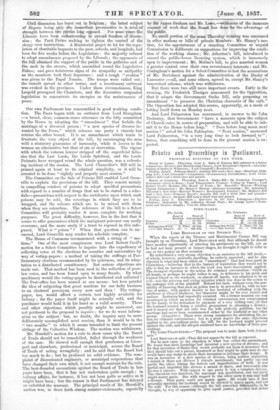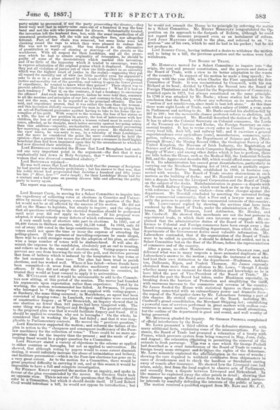nth lirnirriiingn in Varlinintut.
PRINCIPAL BUSINESS OF THE WEEK.
House OF Loans. Thursday, June 4. Sales of Poisons Bill referred to a Select Committee—Divorce and Matrimonial Causes; Lord Brougham's Speech—Administration of Oaths to Witnesses ; Lord Campbell's Resolutions. Friday, June 5. Princess Royal's Annuity Bill read a first time—Merchant Shipping Act ; Lord Albemarle's Complaints—Testamentary Jurisdiction ; Lord Chancellor's Bill read a third time and passed.
HOUSE OF COMMONS. Thursday, June 4. Oaths Bill ; Sir Frederick Thesiger's Statement—Chureb-Itates ; Lord Palinerston's Promise—Voting by Papers ; Lord Robert Cecil's Motion—The Board of Trade ; Mr. Horsfall's Motion—Working Classes Commission ; Mr. Slaney's Motion—Alehouse Licensing ; Mr. Atherton's Bill read a first time—Married Women's Reversionary Interest ; Mr. Molina's Bill read a first time—Princess Royal's Annuity Bill read a third time and passedMinistere-Money (Ireland) Bill read a third time and passed. Friday, June 5. Education ; Question by Sir John Pakington—Election Petitions ; Statement by Mr. Adderley--Sound Dues ; Sir George Lewis's Statement and Motion—Supply ; Vote for Aldershott.
When the report of the Divorce and Matrimonial Causes Bill was brought up on Thursday, Lord Baotou/of said, that although he should have another opportunity of uttering his sentiments on the bill, yet as he had not been present at former stages, he thought it right to refer to one or two points on that occasion. He entertained a very strong objection to an omission in the bill itself,— of which, however, generally speaking, he entirely approved ; and he also objected to what had been called an " amendment " that had been made in Committee,—believing that in the history of legislation they would not be able to find an instance in which the word was more inaccurately applied. The strongest objection to the action for criminal conversation—which on all hands, or perhaps he ought rather to say, in deference to his noble and learned friend on the woolsack, on almost all hands, was admitted to be an evil—was the grievous and crying injustice which was done in the action to the unhappy wife of the plaintiff. Behind her back, without even the possibility of knowing that such an action was to be proceeded in with no service of notice, with perfect facility to her husband of colluding with the adulterer or alleged adulterer, her character might be for ever ruined and undone. Instances had repeatedly occurred. On a former occasion one was mentioned in which an action for criminal conversation was compromised by the family of the defendant by payment of a very trifling sum, all that the husband wanted being a verdict, preparatory to obtaining a divorce ; and it turned out that not only was the wife perfectly guiltless, but the marriage had never been consummated either by the husband or any other person. (Laughter.) These were strong arguments for abolishing the action for criminal conversation ; but to a great degree the same objections applied to the proceedings under the bill, for the husband might proceed against the wife, and the alleged adulterer have no knowledge of those proceedings.
The Loan Citirrer.m.on—" The proposal was to make them both defendants." Lord BROLOHIM said—That did not appear by the bill as reported.
But he now came to the objection to what was called the amendment. He found that their Lordships had invented a new species of divorce ; and for that invention of theirs they would probably not deem it necessary that they should take out a patent, inasmuch as they might be quite sure no one would hare any desire to pirate their invention or infringe their design. It was an invention of a new species of divorce being neither separation a mensal et thoro nor -divorce a vinculo matriinonii, but partly one and partly the other, taking the defects and imperfections of both. It was partial and imperfect like divorce a mends et there, and irrevocable like divorce vineulo. With respect to one party it was a complete divorce. The vinculum was dissolved, the marriage was annihilated, and one party might marrLagain. But with respect to the other party it was only half a divorce. That party could not marry again. He would take it that generally speaking the husband would be allowed to marry again, and not the wife. For this reason—although the bill somewhat dishonestly, AB he thought, by way of appearing to give equal justice, provided that either party might be prevented, if not the party prosecuting the divorce,—they blew very well that in ninety-nine eases out of a hundred it was the husband and not the wife who prosecuted for divorce. Substantially treated, the invention left the husband free, but, with the usual imperfection of all unnatural productions, left the wife not altogether free, nor altogether fettered. Part of her chain was removed, but some links were left clanking round the rags to which they were pleased to reduce her. She was not to marry again. She was doomed to the alternative of prostitution or want—of sinning or starving—of the streets or the workhouse. With all respect for their Lordships, and all the proneness which he had to tannin originality of conception, he should be guilty of some of the inconsistency which marked this invention, and of no little of the hypocrisy which it tended to encourage, were he to express admiration of the original eeenius which it displayed. Supposing they put all violation of justice out of view (no little matter in an assembly which was the highest court of justice in the realm)—supposing they put all regard for morality out of view (no little sacrifice even for argument's sake to do so in a place adorned by the heads of the Church)—supposing justice and morality out of the question, and taking it upon the lower ground of expediency, he wanted to know what they gained ? Their object was to prevent adultery. Had this invention such a tendency ? What if it had no such tendency ? What if, on the contrary, it had a tendency to encourage the offence ? And such was its tendency, unless he were told that, contrary to all the maxims and principles of our law, and contrary to fact, the woman, and not the man, was to be regarded as the principal offender. The law said, and experience proved, that it was rather the man than the woman ; and this invention directly encouraged the man in the offence by giving him an act-of-Parliament guarantee against having to take to his home the accomplice of his guilt. With respect to the woman, the loss of her status as a wife, the loss of her position in society, the loss of intercourse with her children, the loss of everything which a woman valued most in social existence, afforded, RS he thought, much better seem-sty against her going astray than this addition—unjustly, uncharitably, and inexpediently preventing her marrying, not namely the adulterer, but any person. Ile therefore took the view taken, he was sorry to say, by a unnority of their Lordships— and the more he considered the point the more confidently he held the opinion—that a greater blot never was affixed upon a measure in itself highly beneficial than had been imprinted upon this by the amendment to which he had now directed their attention. (Cheers.) Lord REDESDALE reminded the House that Lord Brougham had omitted one very important point in the argument—the fact that it was emphatically laid down in Holy Scripture, that "whosoever married a woman that was divorced committed adultery." Lord BROUGHAM rejoined— He was well aware that Lord Redesdale held that the passage of Scripture he had quoted was absolutely prohibitory ; but his answer to that was, that his noble friend had propounded that doctrine a hundred and fifty years too late (" Hear, hear I " and a laugh); for their Lordships' House had for a century and a half gone on passing divorce bills and allowing the guilty party to marry again.
The report was received.



























 Previous page
Previous page